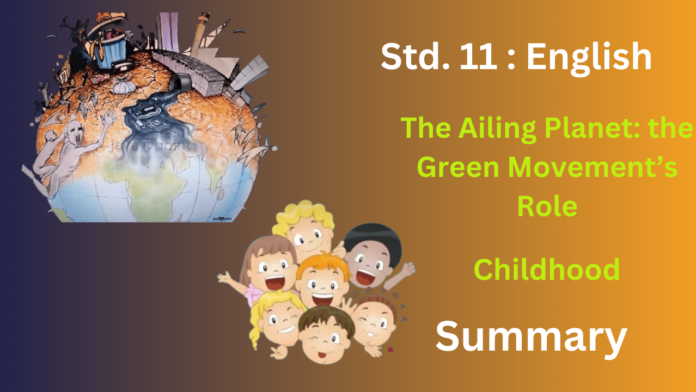“The Ailing Planet: the Green Movement’s Role” from the 11th-grade NCERT English textbook, Hornbill, serves as a stark reminder of Earth’s deteriorating health due to human activities. The chapter outlines the severe environmental damage caused by deforestation, overfishing, pollution, and the rapid depletion of vital biological systems. It underscores the pivotal role of the Green Movement, which emerged in 1972, in fostering a crucial shift in human consciousness towards ecological awareness. This movement popularized the concept of sustainable development, advocating for practices that meet present needs without compromising future generations. The text emphasizes the urgent need to transition to an “Era of Responsibility,” where individuals and industries recognize their duty to protect the environment. It also addresses the detrimental effects of overpopulation. Ultimately, the chapter calls for a collective effort to acknowledge our role as custodians of the planet and adopt sustainable practices to ensure its long-term health.

A.Understanding the text
1.Locate the lines in the text that support the title “The Ailing Planet”.
Ans :
“The Ailing Planet” highlights Earth’s declining health due to human actions, emphasizing the Green Movement’s role in promoting sustainability. Key points include environmental damage, the need for sustainable development, and a call for responsible stewardship.
2.What does the notice “The world’s most dangerous animals” at a cage in the zoo at Lusaka, Zambia, signify?
Ans:
Humanity’s Role: It directly points to humans as the primary cause of environmental degradation.
Self-Reflection: It compels viewers to confront their own actions and their contribution to the planet’s problems.
Accountability: It underscores the need for humans to take responsibility for their ecological footprint.
Urgency for Change: it acts as a wake up call, and a call to action, to change our behaviours.
The unique destructive power of humanity: It shows that while other animals live as a part of the ecosystem, humans tend to disrupt it.
3.How are the earth’s principal biological systems being depleted?
Ans :
Overfishing: Depleting ocean fisheries faster than they can replenish.
Deforestation: Clearing forests for agriculture, urbanization, and timber.
Overgrazing: Excessive livestock grazing, degrading grasslands.
Unsustainable farming: Practices that erode soil and reduce cropland fertility.
Pollution: Contaminating water and land, harming ecosystems.
4.Why does the author agree that the growth of world population is one of the strongest factors distorting the future of human society?
Ans:
Resource Depletion:A larger population demands more resources like food, water, and energy. This increased demand puts immense strain on the Earth’s already limited resources, leading to their rapid depletion.
Environmental Degradation:More people means more pollution, deforestation, and habitat destruction. The increased pressure on the environment accelerates climate change and ecosystem damage.
Economic and Social Strain:Overpopulation can lead to poverty, unemployment, and social unrest, especially in developing nations. It can also strain public services like healthcare and education.
Unsustainable Consumption:A growing population, especially with increasing consumption patterns, exacerbates the problem. The desire for a higher standard of living leads to increased waste and resource use.
Pressure on Biological Systems:As the population grows, increased pressure is put onto the four principal biological systems of the earth, fisheries, forests, grasslands, and croplands.
Talking about the text
Discuss in groups of four:
1.Laws are neither respected nor enforced in India.
Ans:
That statement is a generalization and doesn’t reflect the full complexity of law and enforcement in India. While there are certainly instances where laws are disregarded, it’s inaccurate to say they are never respected nor enforced.
Here’s a more nuanced perspective:
Instances of Non-Compliance:
Corruption: Bribery and other forms of corruption undermine the rule of law.
Environmental Violations: Illegal deforestation, pollution, and other environmental crimes often go unchecked.
Traffic Violations: Many people disregard traffic laws.
Social Norms vs. Legal Norms: sometimes traditional social norms override legal norms.
Instances of Enforcement:
Criminal Law: Serious crimes like murder and theft are generally investigated and prosecuted.
Commercial Law: Many businesses comply with regulations and contracts.
Constitutional Law: The judiciary plays a vital role in upholding the Constitution.
Increasing awareness: There is also an increase in awareness of legal rights, and more citizens are seeking legal recourse.
Factors Affecting Enforcement:
Overburdened Judiciary: Courts face a massive backlog of cases, leading to delays.
Lack of Resources: Law enforcement agencies may lack the resources to effectively enforce all laws
Social and Political Influence: Powerful individuals and groups can sometimes evade legal consequences.
Varied enforcement: Law enforcement varies from region to region, and based on the type of law.
2.“Are we to leave our successors a scorched planet of advancing desert, impoverished landscapes and an ailing environment?”
Ans:
The rhetorical question, “Are we to leave our successors a scorched planet of advancing deserts, impoverished landscapes and an ailing environment?”
1 serves as a stark and emotional warning in “The Ailing Planet.” It transcends a simple inquiry, instead functioning as a dire prediction of a future ravaged by human negligence. The vivid imagery of a “scorched planet” and “advancing deserts” paints a horrifying picture of environmental devastation, forcing readers to confront the potential consequences of their actions. More than just a warning, the question poses a fundamental ethical challenge, highlighting our moral responsibility to future generations. By using the term “successors,” the author emphasizes the long-term impact of our choices, urging us to consider the legacy we leave behind. This powerful question acts as a call to action, compelling individuals to introspect and actively participate in creating a sustainable future. It’s a poignant appeal that aims to shock readers into recognizing the urgency of the environmental crisis and to inspire a shift towards responsible stewardship of the planet.
3.We have not inherited this earth from our forefathers; we have borrowed it from our children’.
Ans:
The statement, “We have not inherited this earth from our forefathers; we have borrowed it from our children,” powerfully reframes our understanding of humanity’s relationship with the planet. It rejects the notion of absolute ownership, instead positioning us as temporary custodians with a profound responsibility to future generations. The concept of “borrowed” emphasizes an inherent debt, compelling us to recognize our obligation to return the Earth in a state that sustains life for those who follow. This perspective necessitates a shift towards sustainable practices, prioritizing long-term ecological health over immediate gains. It underscores an ethical imperative, reminding us that our actions have lasting consequences and that we are duty-bound to preserve the Earth’s resources and ecosystems. This poignant phrase serves as a crucial reminder that we are not the final arbiters of the planet’s fate, but rather temporary stewards entrusted with its care.
4.The problems of overpopulation that directly affect our everyday life
Ans:
The pervasive issue of overpopulation casts a long shadow over our everyday lives, subtly yet significantly impacting our access to essential resources and the quality of our environment. Increased competition for water, food, and energy leads to scarcity and rising costs, straining household budgets and creating anxieties about basic necessities. Public services, such as education and healthcare, become overburdened, resulting in overcrowded classrooms and longer wait times for medical attention. Environmental degradation manifests in the form of air pollution, waste management challenges, and the loss of green spaces, diminishing our quality of life and impacting our health. Economic pressures intensify, with job scarcity, rising living costs, and increased poverty rates becoming more pronounced. Social issues, including heightened crime rates and social unrest, further compound the challenges posed by overpopulation. In essence, the growing number of people on our planet exacerbates existing problems, making daily life more difficult and underscoring the urgent need for sustainable solutions.
Thinking about language
The phrase ‘inter alia’ meaning ‘among other things’ is one of the many Latin expressions commonly used in English.
Find out what these Latin phrases mean:
- prima facie
- ad hoc
- ad infinitum mutatis mutandis
- caveat
- tabula rasa
Ans:
“Prima facie” indicates something accepted as correct until proven otherwise, essentially meaning “at first appearance.” “Ad hoc” designates something arranged or done specifically for a particular situation, implying a temporary or situational nature. “Ad infinitum” describes something that continues without end, stretching out indefinitely. “Mutatis mutandis” signifies that necessary alterations have been made, used when comparing two things with slight differences. A “caveat” acts as a warning or caution, highlighting a potential issue. Finally, “tabula rasa” refers to a clean slate or blank surface, representing something devoid of prior influence.
Working with words
I. Locate the following phrases in the text and study their connotation:
- gripped the imagination of
- dawned upon
- ushered in
- passed into current coin
- passport of the future
Ans:
“gripped the imagination of”:This phrase suggests a powerful and captivating influence. It implies that the idea or concept being discussed has strongly captured people’s attention and interest, holding them in a state of fascination or concern. It suggests a movement that was exciting, and emotionally impactful.
“dawned upon”: This phrase conveys a sudden realization or understanding. It suggests a moment of enlightenment or awakening, where a truth or concept becomes clear and apparent. It indicates a gradual, but then sudden understanding.
“ushered in”: This phrase signifies the beginning or introduction of a new era or period. It suggests a significant change or transition, marking the start of something new and important. It implies that a new time period was led in.
“passed into current coin”: This phrase implies that an idea or concept has become widely accepted and commonly used. It suggests that it has become part of the general vocabulary or understanding, like a currency in circulation. It indicates that the concept became common knowledge.
“passport of the future”: This phrase suggests that something is essential or necessary for future success or survival. It implies that it provides access or entry to a desired future, signifying its importance and value. It implies that without it, the future is closed off.
II. The words grip, dawn, usher, coin, passport have a literal as well as a figurative meaning. Write pairs of sentences using each word in its literal sense as well as the figurative sense.
Ans:
1. Grip
- Literal: The climber had a firm grip on the rope.
- Figurative: Fear gripped his heart as he heard the footsteps.
2. Dawn
- Literal: The dawn broke, painting the sky with soft colors.
- Figurative: The truth finally dawned upon him after hours of confusion.
3. Usher
- Literal: The usher guided the guests to their seats.
- Figurative: The new technology ushered in an era of rapid communication.
4. Coin
- Literal: He found an old coin hidden in the drawer.
- Figurative: The phrase “survival of the fittest” has passed into current coin.
5. Passport
- Literal: She presented her passport at the immigration counter.
- Figurative: Education is the passport of the future.
Things to do
2. Maintain a record of the trees cut down and the parks demolished in your area, or any other act that violates the environment. Write to newspapers reporting on any such acts that disturb you.
Ans:
Actively participating in environmental protection can involve diligently documenting instances of environmental harm in your local area. This includes meticulously recording details about trees being felled, parks being demolished, or any other actions that violate environmental regulations. For each incident, note the precise location, date, approximate scale of damage (number of trees, area of park), the suspected cause, and any involved parties. Photographic evidence can be invaluable in supporting your observations. Once you have compiled a factual and detailed account, consider reaching out to local newspapers. When writing to them, present the information clearly and concisely, backing up your claims with the recorded details and any photographic evidence. Explain the potential environmental impact of the violation and maintain an objective tone. Ensure you include your contact information should the newspaper require further clarification. While it may take persistence, reporting these violations can be a significant step in raising public awareness and encouraging accountability for environmental protection. Remember to prioritize your safety while gathering information and ensure the accuracy of your reports.
Childhood
Markus Natten’s “Childhood” is a reflective journey through the speaker’s search for the precise moment innocence is lost and adulthood begins. The poem’s central question, “When did my childhood go?” echoes throughout, as the speaker contemplates various potential turning points: the end of childhood’s naive belief at eleven, the disillusionment with adults’ hypocrisy, and the realization of independent thought. However, the speaker ultimately concludes that childhood is an elusive, intangible quality, a lost state found only in the innocent gaze of an infant. This suggests that the transition is not a singular event but a gradual fading, a subtle shift from naive faith to the complex realities of adult understanding. The poem captures the universal and bittersweet experience of growing up, marked by the loss of innocence and the emergence of self-awareness.

Think it out
1. Identify the stanza that talks of each of the following.
individuality rationalism hypocrisy
Ans:
Stanza 1 focuses on the theme of rationalism. This stanza likely explores ideas centered around logic, reason, and critical thinking. It might present arguments based on evidence or intellectual analysis, emphasizing the importance of reason over emotions or tradition.
Stanza 2 delves into the concept of hypocrisy. This stanza probably highlights a contradiction between what is professed or claimed and what is actually done or believed. It might depict situations where individuals or groups exhibit behaviors that contradict their stated values or principles.
Stanza 3 addresses the theme of individuality. This stanza likely emphasizes the unique qualities and characteristics of a person, setting them apart from others. It might explore ideas of self-expression, personal freedom, and the importance of being true to oneself, perhaps contrasting it with societal pressures or conformity.
2. What according to the poem is involved in the process of growing up?
Ans:
According to the poem, the process of growing up involves several key realizations and shifts in perspective. It includes the loss of childhood innocence and the understanding that certain beliefs, like the literal existence of Hell and Heaven as geographical places, are not based on reality. Growing up also entails discovering the imperfections of adults, recognizing that their actions may not always align with their words, particularly concerning love. Finally, the poem suggests that a crucial part of growing up is the development of an independent mind, the ability to form one’s own thoughts and opinions, separate from those of others. The poem implies that these realizations mark the passing of childhood, even if the exact moment is difficult to pinpoint.
3. What is the poet’s feeling towards childhood?
Ans:
The poet’s feelings towards childhood, as expressed in the poem, are deeply rooted in nostalgia and a sense of irretrievable loss underscores a poignant search for a vanished era, a time now only a memory. The poem explores potential turning points that marked this departure, such as the disillusionment with literal interpretations of heaven and hell and the unsettling realization of adult imperfections. While acknowledging the development of an independent mind as a part of maturation, the poem ultimately emphasizes the fading of a more innocent and unburdened state. The concluding lines, describing childhood as residing in a “forgotten place” and hidden in an infant’s face, convey a definitive sense of its absence for the speaker, tinged with a gentle melancholy as they reflect on a past that is now beyond reach. The overall tone is one of wistful reflection, rather than resentment, for the simplicity and unquestioning faith that defined their childhood, a precious phase now only glimpsed in the innocence of new beginnings.
4. Which do you think are the most poetic lines? Why?
Ans:
Evocative Imagery: The phrase “forgotten place” creates a sense of mystery and the intangible nature of lost childhood. It’s not a physical location, but a state of being that has vanished from memory.
Powerful Metaphor: The metaphor of childhood being “hidden in an infant’s face” is striking and insightful. It suggests that while the speaker has lost their own childhood, the pure, innocent essence of it still exists in new life. This creates a poignant contrast between the speaker’s current state and the inherent innocence of a baby.
Sense of Closure and Acceptance (with a touch of sadness): The simple statement “That’s all I know” adds a layer of acceptance to the mystery. The speaker doesn’t have all the answers, but acknowledges the reality of the situation. This can be interpreted as a mature understanding of the passage of time and the nature of growing up, yet it carries a hint of sadness in its finality.
Rhythm and Sound: The lines have a gentle rhythm and a somewhat melancholic sound that contributes to the overall feeling of reflection and loss in the poem. The short, declarative last line provides a sense of quiet resolution.


